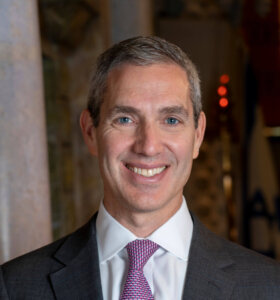How can we heal America? Look to the Egyptians who aided Moses.

The Great Pyramid of Giza and the Great Sphinx, pictured in the 1950s. By H. Armstrong Roberts/ClassicStock/Getty Images
Shocking as this past week’s storming of the Capitol by domestic terrorists may have been, it was not a surprise. There is a direct line between the actions and personalities of last Wednesday and those of Charlottesville in August of 2017.
Trump’s video, issued while rioters were in the Capitol, telling them “We love you. You’re very special” was just a new “Some very fine people on both sides.”
The Nazi slogans brandished last week in D.C. were a natural evolution on the Charlottesville chants of “Jews will not replace us.”
We have seen this coming for years. I am reminded of the Hemingway line in reply to the question “How did you go bankrupt?”
His answer: “Two ways. Gradually, and then suddenly.”
Civil society does not unravel all at once. There is no one moment when conscience crumbles and dissent dies.
According to the Torah, when the Children of Israel first followed Joseph into Egypt, they held an important place in Egyptian society and in the Egyptian imagination. But then “A new king arose over Egypt who did not know Joseph.” For whatever reason — likely because he was threatened — this new Pharaoh systematically “othered” the Israelites, played on Egyptians’ fears to transform a country once defined by “us,” into an “us” and “them.”
According to the rabbis, Pharaoh’s shrewd strategy had a clear method. First he worked to change the cultural climate; then the laws; then the very definition of truth. He was subtle, moving so gradually that when he issued the decree to enslave the Israelites and kill their male children, it was met with little — if any — objection. Each stage of his plan normalized what would have otherwise been unconscionable.
But social norms do not come undone exclusively because of the designs of one man. It took the complicity of many others for Pharaoh’s strategy to be realized. Maybe “Joe Egyptian” thought the bile Pharaoh was spewing could be shrugged off as the indulgent excesses of a charismatic leader: “That’s just Pharaoh being Pharaoh.”
“All right, I don’t like the guy, but he is good for Egypt,” he might have thought. “He projects strength, and just look at all the construction: These pyramids not only boost the economy but give us a point of shared pride.” At a certain point, it gets uncomfortable to take a stand, and be the odd one out. The line between self-interest and self-preservation is not a clear one.
We must learn from the Torah’s account of what happened in Egypt. Pharaoh undoubtedly had his own cohort of true believers. But more consequential were those who facilitated his worst policies, those who were indifferent, complicit or concerned only with their own well-being.
Just as we must learn from those who enabled Pharaoh, so too we can learn from those actions that led to the Israelites’ liberation. That process began with the decision of midwives to disobey Pharaoh’s decree: it teaches that moral courage is within everyone’s reach. So, too, it should not be missed that Pharaoh’s daughter saved Moses, teaching that no matter how close one is to the throne — even as close as Pharaoh’s daughter — it is still possible to act with empathy and conscience. The fact that Moses risked and lost everything by striking down an Egyptian in the process of assaulting an Israelite slave affirms that moral leadership comes not by protecting self-interest, but by protecting the interest of the person who has no one else to protect them.
What is the lesson for an America in pain? Redemption happens step-by-step, one upstanding citizen at a time, making decisions small and large to push back. It is really not more complicated than that. May we all learn from the events of the past week gone by and strive to step up to the calling of the hour.
Elliot Cosgrove is the Rabbi of Park Avenue Synagogue, Manhattan
A message from our Publisher & CEO Rachel Fishman Feddersen

I hope you appreciated this article. Before you go, I’d like to ask you to please support the Forward’s award-winning, nonprofit journalism so that we can be prepared for whatever news 2025 brings.
At a time when other newsrooms are closing or cutting back, the Forward has removed its paywall and invested additional resources to report on the ground from Israel and around the U.S. on the impact of the war, rising antisemitism and polarized discourse.
Readers like you make it all possible. Support our work by becoming a Forward Member and connect with our journalism and your community.
— Rachel Fishman Feddersen, Publisher and CEO
























